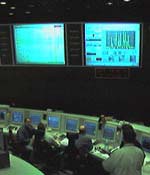Image credit: ESA
The first opportunity for Mars Express to hear from Beagle 2 has come and gone, and so far, there's just silence. The spacecraft passed over the anticipated landing area Tuesday, at 1213 UTC (7:13 am EST) and attempted to make contact with the lander. Several more attempts are planned for the coming days, and now that Mars Express has reached its operational orbit, there should be plenty of opportunities to hear from Beagle 2 if it's still intact on the surface of Mars.
ESA?s Mars Express orbiter made its first attempt to establish contact with the Beagle 2 lander, after the two spacecraft separated on 19 December 2003.
The orbiter made its first pass over the Beagle 2 landing site today at 13:13 CET, but could not pick up any signal from the tiny lander. More attempts to contact Beagle 2 are planned in the days to come.
Beagle 2 was released on 19 December on a course towards the Red Planet by Mars Express, the mothership for the 400 million kilometre interplanetary cruise. Six days later it entered the Martian atmosphere and should have landed on the near-equatorial site of Isidis Planitia.
Since then, attempts to communicate with the lander through NASA?s Mars Odyssey orbiter and radio telescopes on Earth have been unsuccessful.
The Mars Express orbiter successfully entered Mars orbit at about the same time as Beagle 2?s landing. Then, in early January, it made a series of planned manoeuvres to change its equatorial orbit to a polar one, to prepare for its scientific mission and to make contact with Beagle 2.
Unlike Mars Odyssey and the radio telescopes, Mars Express has a communication system that was fully tested to contact Beagle 2, which gives ESA more confidence of picking up the signal in the coming days.
?We have not lost hope yet to contact Beagle 2, but we also know that it has landed on an unforgiving planet,? said David Southwood, ESA?s Director of Science.
?There are still opportunities to make contact with Beagle in the days to come, and we are giving our best efforts. Nevertheless, our spacecraft Mars Express has now reached its operational orbit and is working well; I know the science community is eagerly waiting for its first results.?
ESA News Release
 Universe Today
Universe Today
